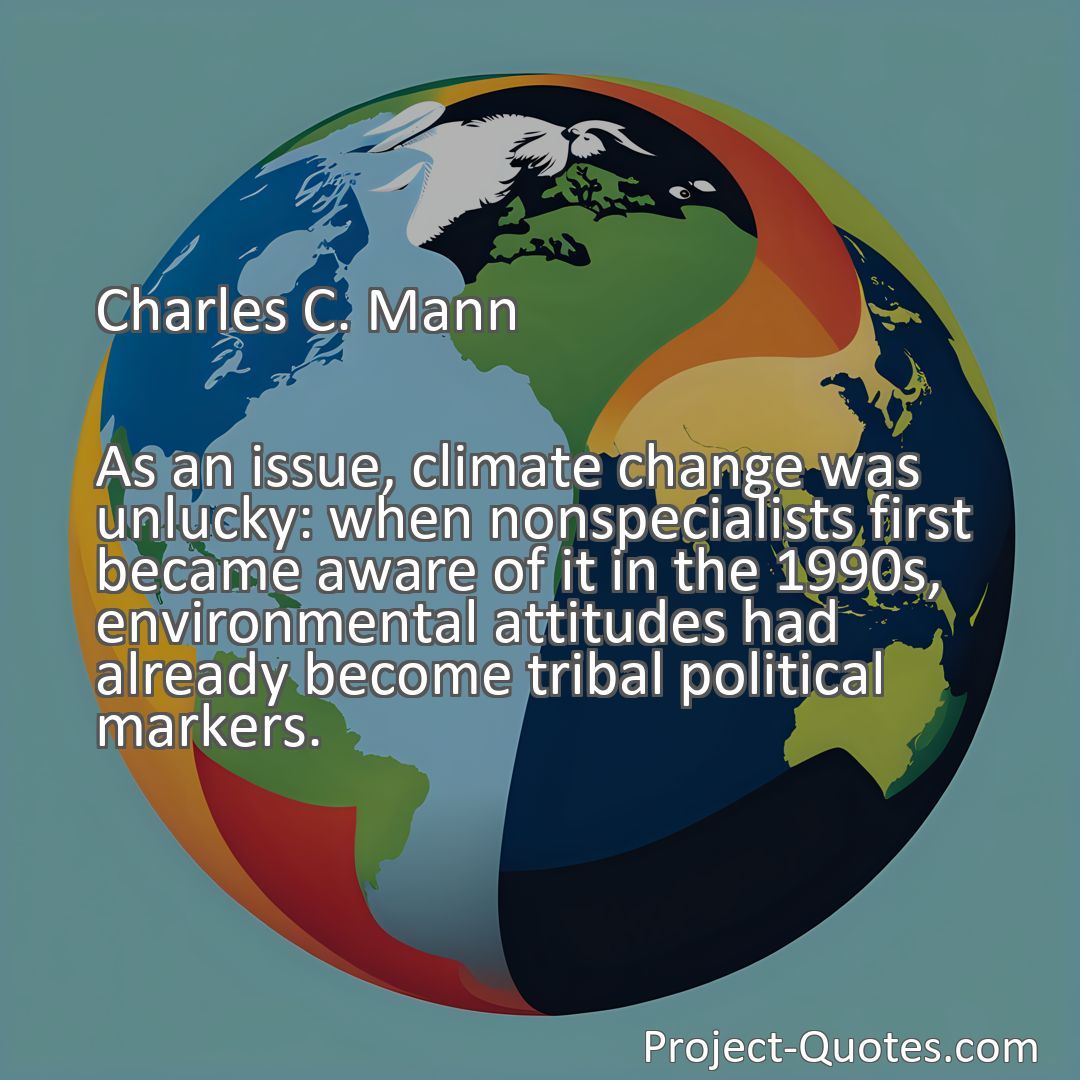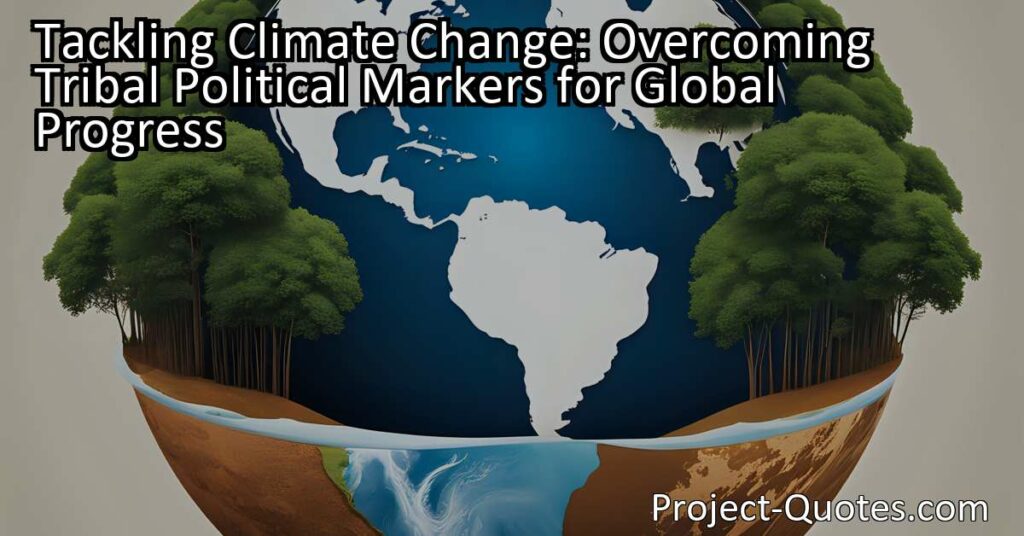As an issue, climate change was unlucky: when nonspecialists first became aware of it in the 1990s, environmental attitudes had already become tribal political markers.
Charles C. Mann
In the pursuit of tackling climate change, tribal political markers have hindered progress and divided people. The issue of climate change has been politicized, with individuals on both sides of the spectrum firmly entrenched in their beliefs. Overcoming this tribalism is crucial for collaboration, education, and policy-making in order to effectively address the urgent challenge of climate change.
Table of Contents
- 1 As an issue, climate change was unlucky: when nonspecialists first became aware of it in the 1990s, environmental attitudes had already become tribal political markers.
- 2 Charles C. Mann
- 3 Meaning of Quote – As an issue, climate change was unlucky: when nonspecialists first became aware of it in the 1990s, environmental attitudes had already become tribal political markers.
- 4 Freely Shareable Quote Image
- 5 Related
Meaning of Quote – As an issue, climate change was unlucky: when nonspecialists first became aware of it in the 1990s, environmental attitudes had already become tribal political markers.
In today’s world, it seems like everyone is divided into tribes. Whether it’s the sports team we support, the music we listen to, or the political parties we align ourselves with, we tend to gravitate towards groups that share our values and beliefs. Unfortunately, this tribal mentality has also seeped into discussions of climate change, hindering progress towards finding solutions to one of the greatest challenges humanity has ever faced. As Charles C. Mann, an expert on environmental issues, aptly stated, “As an issue, climate change was unlucky: when nonspecialists first became aware of it in the 1990s, environmental attitudes had already become tribal political markers.”
Climate change, the gradual increase in Earth’s average temperature caused by human activities, has been a hotly debated topic for decades. However, what should be a matter of scientific study and urgency has been twisted into a political battleground, with people on both sides of the spectrum deeply entrenched in their beliefs. Instead of approaching the issue with open minds and a willingness to listen to different perspectives, many individuals have adopted a mentality of “us versus them.”
This tribalism surrounding climate change can be traced back to the 1990s, when the issue began gaining widespread attention. At that time, environmental attitudes were already closely associated with political alignments. Those on the left tended to view environmental protection as a priority, while those on the right often saw it as an obstacle to economic growth. Unfortunately, as climate change emerged as a pressing concern, it became viewed through the lens of these preexisting political divides.
What should have been a matter of scientific consensus and collective action was turned into a contentious debate. Discussions about the validity of climate change science and the need for action were overshadowed by partisan politics. Instead of working together to find solutions, people became more interested in defending their tribes and refuting the other side’s claims.
One consequence of this tribal mentality is the widespread dissemination of misinformation. As individuals sought to defend their own beliefs, they often cherry-picked data or relied on sources that confirmed their preconceived notions. This led to the perpetuation of myths and falsehoods, making it difficult for the public to separate fact from fiction. In the age of social media, where information spreads rapidly, these falsehoods can quickly gain traction and lead to further division.
Moreover, the tribalism surrounding climate change has hindered policy-making and cooperation between nations. International agreements, such as the Paris Agreement, which aims to limit global warming to well below 2 degrees Celsius, require collective action and collaboration. However, the politicization of climate change has made it challenging for countries to come together and take meaningful steps towards addressing the issue.
Overcoming this tribalism is crucial if we are to effectively tackle the problem of climate change. It requires a shift in mindset and a willingness to engage in productive dialogue. Rather than viewing the issue through a political lens, we must approach it as a shared global challenge that requires immediate attention and action.
Education also plays a vital role in dispelling misinformation and promoting informed discussions. By providing students with a comprehensive understanding of climate change science, its impacts, and potential solutions, we can equip the next generation with the knowledge and critical thinking skills necessary to confront this issue head-on. Encouraging curiosity and open-mindedness will help break down the barriers of tribalism and foster collaboration.
Additionally, it is essential for political leaders and policymakers to prioritize climate action over partisan gains. By setting aside differences and working towards a common goal, we can develop comprehensive and effective policies that mitigate the impacts of climate change. Emphasizing the potential economic benefits of transitioning to renewable energy sources, for example, can help bridge the divide and garner support from across the political spectrum.
Ultimately, the fight against climate change transcends political ideologies. It is a matter of ensuring the sustainability and well-being of our planet for future generations. As Charles C. Mann noted, climate change was unfortunate in its timing, coinciding with the already deeply divided political landscape. However, we have the opportunity to rise above this tribalism and come together to address this existential threat.
In conclusion, the tribal mentality that has pervaded discussions on climate change has hindered progress and perpetuated division. However, by recognizing the importance of collaboration, education, and a willingness to engage in meaningful dialogue, we can begin to bridge the gap and work towards viable solutions. The time to act is now, as the consequences of climate change will be felt by all, regardless of political affiliation. Let us put aside our tribes and unite in the fight against this global challenge.
I hope this quote inspired image brings you hope and peace. Share it with someone who needs it today!


